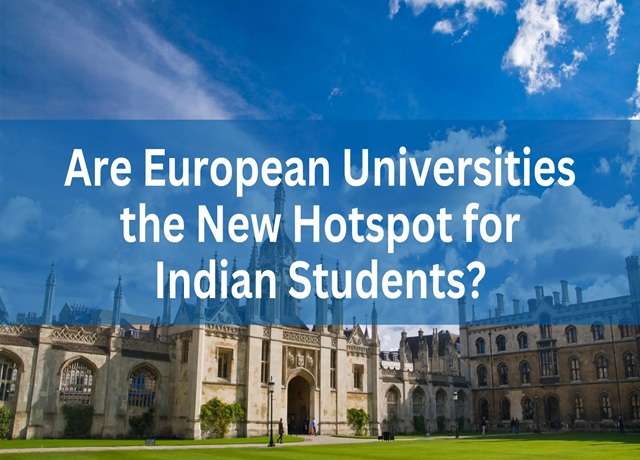In recent years, European universities have emerged as attractive destinations for Indian students seeking higher education abroad. This shift towards study in Europe is driven by a combination of high-quality education, diverse cultural experiences, and favorable post-study opportunities. Notably, countries like Germany have seen a substantial increase in Indian student enrolments, with numbers quadrupling over a seven-year period since 2008, particularly in STEM fields.
The Appeal of European Universities
European institutions are renowned for their academic excellence, offering a wide array of programs that cater to various interests and career aspirations. The ‘Bologna Process’ has harmonized higher education across Europe by creating a standardized three-cycle degree structure of bachelor’s, master’s, and doctorate, ensuring that degrees are recognized internationally. This framework enhances student mobility through the European Credit Transfer and Accumulation System (ECTS), allowing students to transfer credits easily across institutions. It also promotes quality assurance and comparability in higher education, making it easier for Indian students to pursue further studies or employment across Europe.
Moreover, many European countries provide reasonably-priced or even tuition-free education, especially in public universities, making them affordable study-abroad destinations. For instance, Germany’s public universities charge minimal or no tuition fees, making it an economical choice for Indian students. Additionally, the availability of courses taught in English has lowered language barriers, broadening accessibility.
Germany: A Case Study
Germany exemplifies the growing trend of Indian students choosing Europe for higher education. The number of Indian students in German universities has risen from 3,516 in the 2008–09 academic year to 49,483 in 2023–24, marking a substantial increase. This growth is largely attributed to the country’s strong emphasis on STEM education, strong industry connections, and favorable post-study work opportunities. Germany allows international graduates to stay up to 18 months after graduation to seek employment, making it a prime destination for career-focused students.
United Kingdom: Tackling Challenges
The UK has traditionally been a popular destination for Indian students. However, recent political shifts and stricter immigration policies have posed challenges. The introduction of measures such as bans on family members of students and higher salary thresholds for skilled worker visas has led to a decrease in non-EU postgraduate applications. These changes have made it more difficult for UK universities to attract international students, prompting institutions to explore alternative strategies.
Emerging Trends: UK Universities in India
In response to domestic financial challenges and to tap into India’s vast student market, several UK universities are establishing branch campuses in India. The University of Southampton, for example, has launched a campus in Gurgaon, with others like Newcastle, Surrey, and Coventry planning similar initiatives. These campuses aim to offer UK degrees at more affordable rates, providing Indian students with quality education without the need to relocate abroad.
Sustainability in European Business Schools
European business schools are increasingly integrating sustainability into their curricula, reflecting the continent’s progressive climate policies. This focus aligns with the growing global emphasis on Environmental, Social, and Governance (ESG) factors. Institutions such as the Stockholm School of Economics and Finland’s Aalto University emphasize multidisciplinary approaches to sustainability, preparing graduates to address contemporary challenges.
Cultural Diversity and Global Exposure
Studying in Europe offers Indian students a chance to immerse themselves in a multicultural environment. The continent’s rich history, diverse cultures, and the opportunity to learn new languages enhance the overall educational experience. This cultural immersion not only broadens personal horizons but also fosters global citizenship, a trait highly valued in today’s interconnected world.
Indian Student Scholarships and Financial Aid in Europe
Many European countries and institutions offer scholarships to support international students. The Orange Tulip Scholarship, managed by Nuffic, provides opportunities for students from countries like India to study in the Netherlands. Similarly, the Cambridge Commonwealth, European & International Trust offers scholarships to international students accepted at the University of Cambridge. These financial aids make European education more accessible for Indian students looking for budget-friendly options.
Post-Study Work Opportunities
One of the biggest advantages of studying in Europe is the availability of work opportunities through post-study work visas. The Netherlands offers a one-year ‘orientation year’ residence permit for graduates to find work or start a business. France allows non-EU graduates to stay for up to two years under special visa provisions. These opportunities provide Indian students with a pathway to gain international work experience, enhancing their employability.
Challenges and Considerations
While Europe presents numerous opportunities, Indian students must consider certain challenges. Language barriers can be a concern in non-English speaking countries, although many universities offer programs in English. Additionally, understanding the visa and immigration policies of each country is crucial to ensure compliance and to take full advantage of post-study work opportunities.
European universities are indeed becoming hotspots for Indian students, offering a blend of academic excellence, affordability, cultural richness, and promising career prospects. The increasing presence of UK universities in India and the growing number of Indian students in European institutions highlight this trend. While challenges exist, such as handling immigration policies and adapting to newer environments, the overall trend indicates a positive shift towards Europe as a preferred destination for higher education among Indian students.




